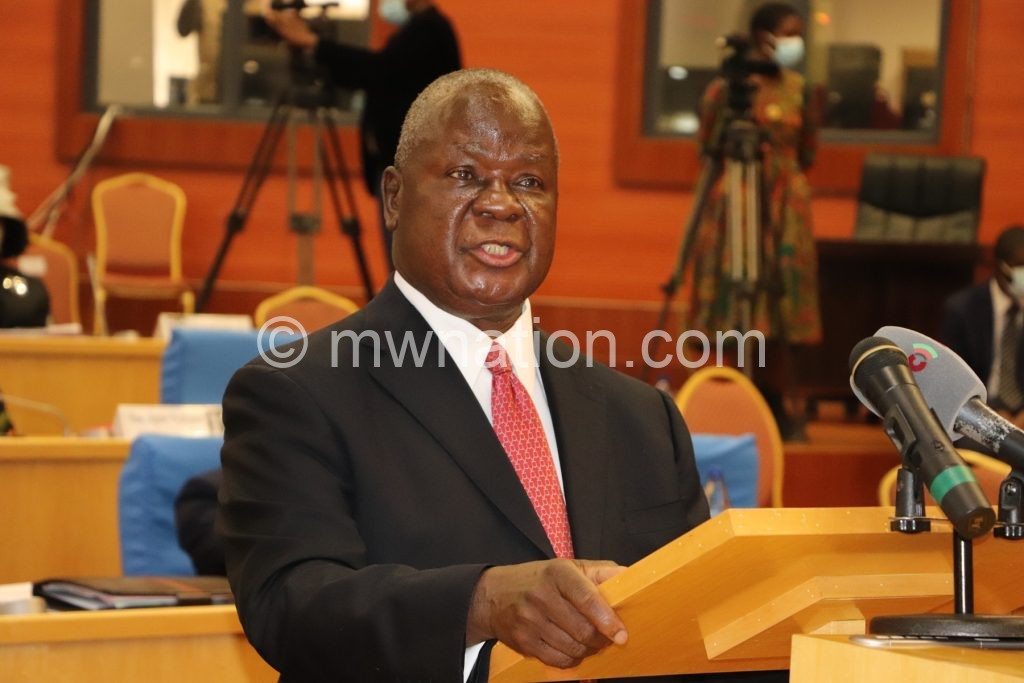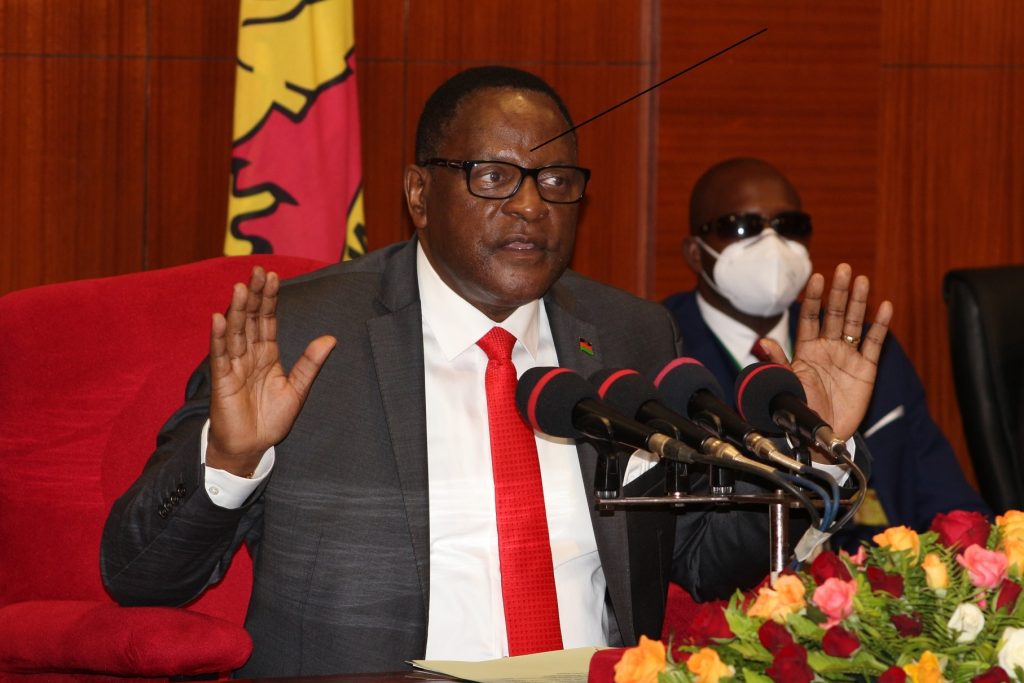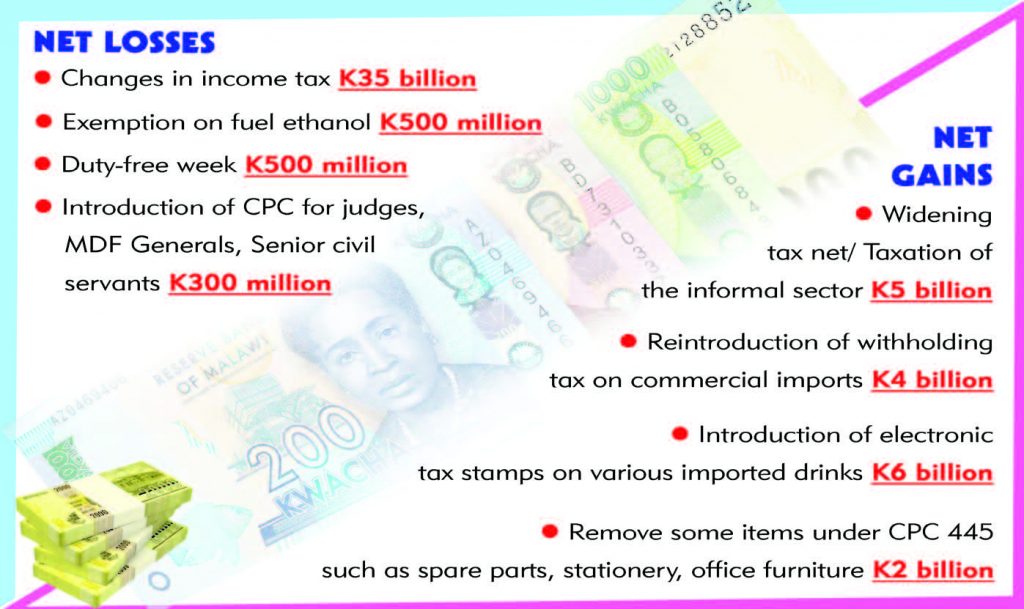Campaign tax promises drain K38bn
New tax measures introduced to fulfil Tonse Alliance election campaign promises such as duty-free week and revised income tax brackets will rob the public purse about K38 billion, it has emerged.
The estimated losses are contained in a presentation titled Tax Revenue Performance in the 2020/21 Fiscal Year and 2021/22 Tax Measures which the Malawi Revenue Authority (MRA) presented to the Budget and Finance Committee of Parliament on May 29.

The presentation pegs potential revenue loss due to the introduction of the duty-free week at K3 billion.
On the other hand, new income tax or Pay As You Earn (Paye) measures in the 2021/22 National Budget, which rolled out on Thursday, will lead to K35 billion revenue loss. Under the new measures, government eased the tax burden of low-income earners at the expense of revenue.
Speaking when he presented the budget in Parliament, Minister of Finance Felix Mlusu announced the introduction of duty-free week for imports not exceeding $3 000 (about K2.4 million) to boost the growth of small businesses and “reinvigorate” the economy suffering from effects of Covid-19 pandemic. He said taxpayers will benefit from the facility once a year.

The minister also reduced taxes on wage earners in the K100 001 to K1 million bracket per month from 30 to 25 percent while introducing a new income tax bracket of 40 percent for earners of above K6 million per month. The developments came one year after doubling the zero-rated tax threshold from k45 000 to K100 000.
In its presentation, MRA clarified that all goods to be imported during the duty-free week will be cleared under the Customs Procedure Code (CPC) and that all beneficiaries of the initiative will be required to have a Taxpayer Identification Number (Tpin).
“Incorporated businesses will not qualify. A taxpayer can only benefit once,” says MRA.
In an interview on Thursday, Consumers Association of Malawi (Cama) executive director John Kapito said government cannot continue to be “Father Christmas” at a time when Malawians are struggling to meet the most basic needs and social services.

He said: “When you introduce a free-tax week, what that means is that not every Malawian will benefit from that initiative. It will be only those that are involved in such businesses and also the most powerful ones as they will be able to recruit a number of people to import the goods.
“This is not an economy where you can follow or manage such an initiative because we have so many unscrupulous traders that will take advantage and take may be 200 people and give them $3 000 each and bring in consignments.”
On Paye adjustments, Kapito said it was worrying that government would forgo an estimated K35 billion, saying this is the time to build the economy and not offering freebies.
He said: “We cannot go for free lunch at the moment in a country like ours where things have fallen apart. This is a house broken into and we have been invaded by serious economic challenges.”
But on the flipside, MRA expects positive revenue impact from some of the tax measures, citing the increase in excise tax on gaming and betting which it says will result in the national tax revenue buffer accruing an extra K1 billion while the introduction of electric tax stamps on various products such as alcohol, carbonated soft drinks, sugar and flavoured water is expected to bring a positive revenue impact of K6 billion as the measure will curb counterfeits and smuggling.
Tax revenue target in the 2021/22 budget has been pegged at K1.03 trillion, a figure which translates into a 28 percent growth when compared to what was collected in the 2020/21 Budget. The overall balance for the 2021/22 Budget—the second substantive budget for Tonse Alliance administration—is K723.8 billion, which represents seven percent of the rebased gross domestic product (GDP).
At K723.8 billion, the budget deficit is the second highest budget hole in the history of Malawi, in nominal terms, as the K2.3 trillion Tonse government’s maiden budget—which expired on Wednesday—had a yawning deficit of K811 billion or 8.8 percent of GDP.
On one hand, the institution cites the increase in zero-bracket Paye threshold, outdated laws, smuggling and culture of non-tax compliance as major challenges that affected the collection of revenue in the 2020/21 Budget.
In an interview on Thursday, Blantyre-based tax expert Emmanuel Kaluluma said currently, Tonse government’s hands are tied as it made the duty- free week promise; hence, it is obliged to fulfil.
He said: “Taxation is about taking money from the haves to the have-not and this [duty-free week] will do the opposite.”
On the Paye adjustments in the 2021/22 Budget, Kaluluma said while the K35 billion loss is just an estimate, with K100 000 zero tax, it means more people are not contributing towards building the nation’s prosperity.
He also said by adjusting such Paye thresholds, government has done its part and now the onus is with employers whom he said must increase their employees wages to throw more people into the tax net.
In an interview on Thursday, MRA spokesperson Steve Kapoloma said the revenue impact of all the tax measures were already factored in the revenue projections for the 2021/22 Budget; hence, the authority has all the confidence that it will meet the tax target.
In its latest biannual publication on Malawi, the Malawi Economic Monitor which was launched last week in Lilongwe, the World Bank has also spoken against the duty-free week as well as the Paye adjustments.





